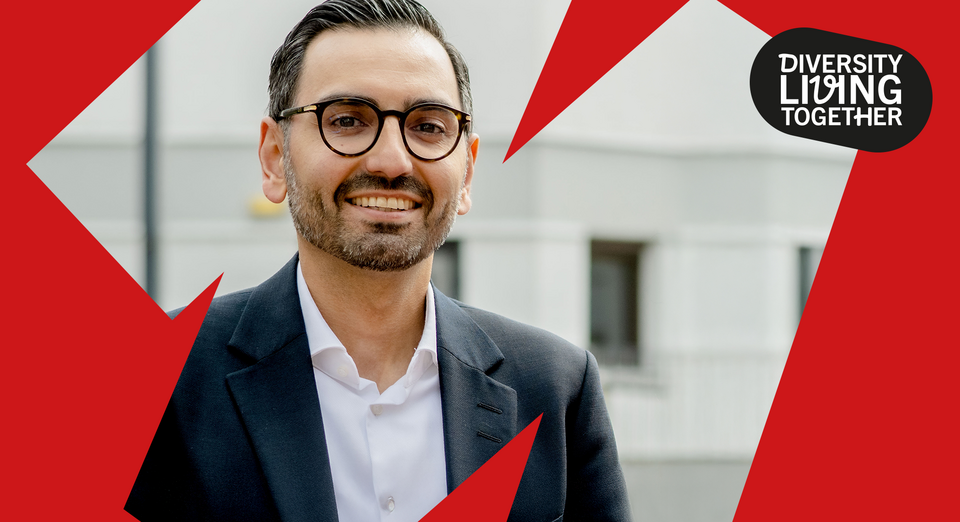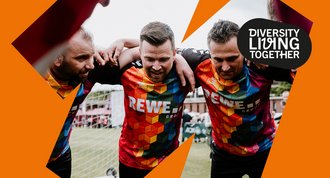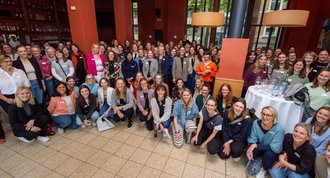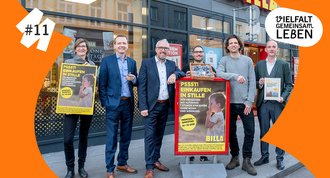
Prof Dr Karim Fereidooni is a social scientist and one of the leading voices on criticism of racism, educational equality and participation in a diverse society. In this interview, he explains why it is not enough to simply celebrate diversity - and what both companies and individuals can do proactively to promote participation in the workplace, for example.

one: Prof Fereidooni, why is the topic of participation and exclusion particularly important for a company like REWE Group?
Fereidooni: Because a company like REWE Group is at the centre of society - with employees, customers and partners who are very diverse. Anyone who is not sensitive to unequal treatment here is not only overlooking potential conflicts, but also opportunities. Participation creates a better working atmosphere and better performance - as many studies have shown.
one: In concrete terms, what steps can everyone take to promote more openness and participation?
Fereidooni: It starts on a small scale. Listening, not immediately making judgements, asking questions instead of making hasty judgements - these are not complicated measures, but they work. Openness starts with an attitude: Do I want to understand or do I want to be legal? If you decide in favour of understanding, you automatically become more sensitive to discrimination and exclusion.
„Openness starts with an attitude: Do I want to understand or do I want to be legal? Those who decide in favour of understanding automatically become more sensitive to discrimination and exclusion.“
Prof Dr Karim Fereidooni
one: You mentioned many terms in your presentation - from ableism to heteronormativity. Which of these mechanisms do you encounter most frequently in everyday life - and how do you recognise them?
Fereidooni : I actually experience everyday racism most often - subtle forms of marginalisation, for example through stereotypical attributions: "But you speak good German!" - that's supposed to sound nice, but it shows that the other person is obviously not seen as part of the majority society. It is similar with heteronormativity, i.e. the assumption that everyone is heterosexual - this happens in conversations about partnerships or family, for example.
one: How can senior managers ensure that employees with a history of immigration feel seen and supported?
Fereidooni : Firstly, by being aware of their own perspective. Many senior managers don't realise that they themselves work with certain norms and assumptions. Anyone who deals with questions such as "Who actually gets promoted?" or "Who do I automatically trust more?" lays the foundation for fairer leadership. What's more, promotion doesn't just mean training and programmes, but also space for experience and voice - every day.

Fereidooni : Meeting at eye level is key - but not forced. It's about creating spaces in which employees can talk about their experiences without being judged. This can be a moderated team discussion, a regular exchange in small groups or even an anonymous feedback system. The important thing is that the managing directors must take this seriously. If diversity is seen as an "add-on", it won't work. Diversity needs an attitude - not just programmes.
one: The CSD in Cologne - a major political event that we at REWE Group have supported for years. At the same time, some major sponsors are pulling out. How concerned are you about such social developments?
Fereidooni: I am very concerned because we are seeing freedoms that have been won around the world being pushed back again - be it in the area of sexual diversity, women's rights or the treatment of migrants. When companies like REWE Group take a stand and position themselves clearly, it sends a strong signal. Right now, we need people and institutions that don't change direction with the wind, but stand up for openness, tolerance and democracy even in stormy times.
Thank you very much for the interview!
Participation describes the active involvement of people in social life. People should be able to decide for themselves whether, where, how and why they get involved and contribute.

Ableism. Ableism means that people with disabilities or chronic illnesses are marginalised. They are often only judged by what they (supposedly) cannot do - and are reduced to this instead of being seen as a holistic person.
Caregiver discrimination. In addition to childcare, caring for relatives is becoming increasingly important for many working people - especially as the population ages. When people have disadvantages at work because they look after children or relatives in need of care, this is known as "caregiver discrimination". This means that carers are disadvantaged in their professional life - for example because of parental leave or caring leave.
Heteronormativity. Heteronormativity means that many people assume that only heterosexuals and cis people (i.e. people whose gender identity matches the gender assigned to them at birth) are "normal". Other sexual orientations or gender identities are then considered "different" - and are often not accepted, excluded or overlooked.
Sexism. Sexism means that people are disadvantaged or treated less favourably because of their social gender. This is often based on fixed role models and prejudices. Women, lesbians, trans, inter- and non-binary people (FLINTA for short - this stands for women, lesbians, inter, non-binary, trans and agender or asexual people) are particularly frequently affected by sexism.
Racism. Racism means that people are treated less favourably because of external characteristics or their origin - for example because of the colour of their skin, their name, their language or their hair. As a result, they are disadvantaged, excluded or devalued.
Classism. Classism means that people are disadvantaged or devalued because of their social background or social status. This is often about things such as income, education or profession. Prejudices against certain social groups are often behind this.
(Neo)linguicism. (Neo)linguicism means that people are disadvantaged or devalued because they speak a certain language or speak in a way that is related to their origin. This often manifests itself in prejudice or derogatory comments about their language or linguistic style.
Source: Lecture "The power of imagination. How can our society become more inclusive for all people?", by Prof. Dr Karim Fereidooni, 22.5.2025.

The first step in getting rid of prejudices is to become aware of them and put them to the test. Reflecting on our own situation, our own privileges, encourages us to deal with participation in all its facets. What's more, each and every individual can actively advocate for the participation of all, even on a small scale, for example in the workplace. Curious? Here are some practical tips.

Prof Dr Karim Fereidooni is Professor of Didactics of Social Science Education at the Ruhr University Bochum. He is a member of the didactics teaching and research unit at the Faculty of Social Sciences and also a co-opted member of the Faculty of Philosophy and Educational Science. His research focusses on: Criticism of racism in educational institutions, school research and political education in the migration society, diversity-sensitive teacher training.













